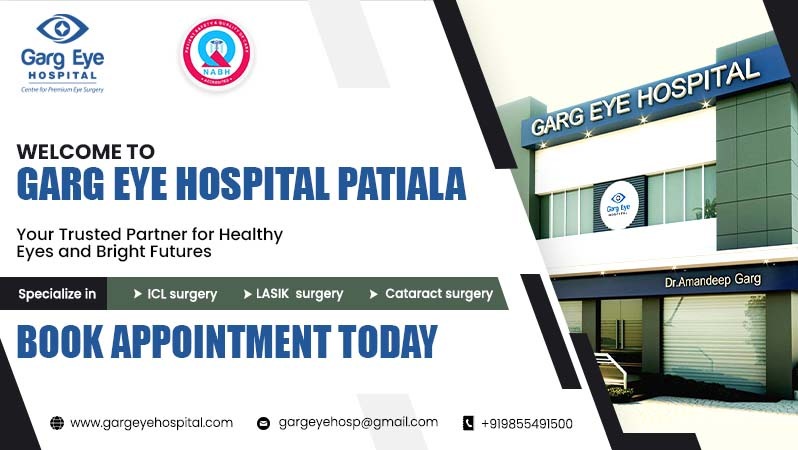- Open Hours: Mon-Sat 9:15 am - 6:30 pm
- +91 9855491500
- gargeyehosp@gmail.com
What’s the Best Time to Get LASIK Surgery?
For those with astigmatism, farsightedness, or nearsightedness, LASIK surgery is a life-changing procedure that provides freedom from glasses or contact lenses. The timing of your LASIK treatment can have a big impact on your recovery and overall outcomes, even if the actual surgery is a brief outpatient procedure. This article examines the most important aspects to take into account when choosing the ideal time for LASIK surgery, such as the best time to guarantee the greatest results, ideal recovery circumstances, and procedural needs.
Table of Contents
ToggleAre You a Good Candidate for LASIK Surgery?
Your eye surgeon will conduct a thorough evaluation to ascertain your suitability before setting up LASIK. The following are the main things to think about:
1. Eye health and age
Usually, candidates must be at least eighteen years old and have had steady vision for a minimum of a year.
2. Thickness of the cornea
Your cornea needs to be sufficiently thick to endure the reshaping procedure without experiencing any issues. The danger of surgery is increased by a thin cornea.
3. General Health
Because they can interfere with healing, those with certain medical conditions, such as autoimmune illnesses or uncontrolled diabetes, might not be the best choices.
4. Allergies that are seasonal
It could be necessary to plan your surgery for a time when your allergies are less active if you suffer from seasonal allergies. The corneal flap, which is essential to the procedure’s success, could be moved if you rub your eyes during recuperation.

A smooth healing process is ensured by optimal recovery conditions
For your LASIK procedure to be successful, the recuperation phase is essential. When organizing your procedure, take into account following factors:
1. Give yourself time to recover
Complete corneal healing may take several weeks, however most people can return to their regular activities in as little as 24 hours. Steer clear of booking LASIK right before important occasions like trips or physically taxing activities.
2. Steer clear of irritants
It’s crucial to keep perspiration, water, and makeup away from your eyes for the first two weeks following LASIK. Plan your procedure well in advance if you intend to swim, hike, or partake in other physically demanding activities.
3. Weather that is conducive to recovery
Since there is less chance of perspiration and discomfort, cooler months with lower humidity levels are frequently best for recuperation. However, wintertime interior heating can cause eye dryness, therefore it’s crucial to use a humidifier if needed.
Personalized to Your Lifestyle: The Ideal Time for LASIK Surgery
Your personal schedule, lifestyle, and environmental circumstances should all be taken into consideration when scheduling your LASIK procedure. The following situations will help you make a decision:
1. Have a clear vision at the beginning of the year
Many individuals decide to pay for LASIK procedures using their Health Savings Account (HSA) or Flexible Spending Account (FSA). Since these accounts frequently reload at the start of the year, now is a great opportunity to plan the procedure while money is still accessible.
2. Convenience in the spring
If you intend to take summer holidays, spring may be the best season for LASIK. You can fully recuperate and enjoy outdoor activities without the need for contacts or glasses if you schedule your treatment for the spring.
3. Teachers and Students in the Summer and Fall
Summer or fall breaks are frequently convenient for LASIK for professionals with academic schedules, like teachers and students. This guarantees enough time to recuperate before going back to job or school.
4. Wedding preparation
A lot of people decide to have LASIK before important life events like weddings. To ensure optimal outcomes and prevent stress at the last minute, plan the surgery at least one month before to the big day.

Extra Things to Think About
Weather and the accuracy of surgery
According to research, the laser’s accuracy may be impacted by decreasing humidity during the cooler months. Skilled surgeons alter equipment settings to accommodate for these changes, guaranteeing consistent results throughout the year.
Wintertime Eye Health
During your recuperation, indoor warmth may cause your eyes to get dry if you reside in a region with severe winters. Keep hydrated and use a humidifier to combat this.
See Your Surgeon
The greatest person to help you choose the optimal timing for LASIK is ultimately your surgeon. They will consider your lifestyle, eye health, and any seasonal factors that may impact your recuperation.
A Checklist for LASIK Preparation
- Make an appointment for an eye exam to evaluate your eligibility.
- Choose a time when you have few obligations, either personal or professional, to have your procedure.
- Steer clear of booking LASIK right before trips or activities that call for a lot of physical exertion.
- To guarantee a speedy recovery, carefully adhere to the pre- and post-operative care guidelines.
Wrapping Up
There isn’t a single, ideal moment for LASIK surgery; rather, it depends on your particular situation and way of life. Planning ahead and speaking with a skilled surgeon are crucial, whether your goal is to maximize your recuperation during a slow season or to achieve clear eyesight prior to a significant event. You may get the best outcomes and live a clear-eyed existence by coordinating your lifestyle, health, and routine.
Now is the time to take the first step toward clear vision and a life free from corrective lenses. With the right planning and expert guidance, LASIK can transform your world. Why wait? Start your journey today!




